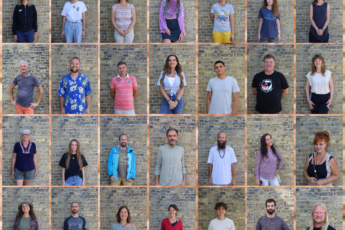
Cancer is our souls way of letting us know that our life is not worth living – under the current conditions. Change the conditions. Or accept to live with them. Take care of the needs of your soul and spontaneous remission is likely to occur.
Read below to understand how I arrived at that conclusion.
My experience with cancer
Since I was trained as a Macrobiotic food counselor in 1981, people with cancer have been amongst the people who searched for my guidance. From all these people, I have derived an understanding of what cancer is and a path to dealing with it that seems to work.
In the beginning I believed that cancer primarily hit people with a poor diet and lifestyle and little awareness about how to take care of themselves. I was convinced that the cure was a change in diet and lifestyle. And it worked in many cases. When some of my teachers got cancer, and several of them died from it, I realized that there was more to it.
In 2001 I developed the Aima tools for self reflection and transformation to support people in changing their habits, because it was frustrating that many people, in spite of experiencing good results with a change of diet and lifestyle, reverted back to old habits as soon as they felt better – and with the old habits their ailments came back. I wanted lasting solutions.
Shortly after, I had a very humbling experience. Coaching a lady with 4 metastases in her brain totally changed my view on cancer.
She had said no to chemotherapy and a clairvoyant lady had told her to see me. I guided her with my newly developed Aima tools to find peace of mind with such a severe diagnosis. In the process it became clear to her that the cause of her cancer was that she hadn’t trusted herself. As I guided her through Aima’s transformation procedure, she let go of distrust in herself and designed a path to follow to increase trust in herself. I suggested that we also take a look at her diet. She said thanks, but no thanks. She was convinced that if she followed this path, the cancer would leave, as it had no longer any reason to be there. I felt helpless, because I was convinced she had to change her diet to get well. Since I couldn’t find a way of convincing her without ruining her newly gained trust in herself, I let her go. I felt I had made a terrible professional mistake. After a few weeks of agony, she wrote that she had been checked and the cancer was gone. I was very humbled and I understood that my understanding of cancer had been too mechanical.
Over the years, I’ve had several similar experiences. A session lasting 2-3 hours, where I guide the client to find the root of their cancer and transform it into a new direction has been followed by a spontaneous remission. Simple and straightforward.
However, I’ve also had some cases that were not so simple and although the cancer didn’t go into remission, the person had a better quality of life.
A man in his sixties found that the root cause of his cancer was that he over many years had treated his back pain with morphine, which wasn’t aligned with his values. He wasn’t able to let go of morphine and the cancer kept growing.
Another lady in her sixties found that the root of her lung-cancer was that she couldn’t accept that her quality of life had become poor due to a smoker’s lung disease. Since she was neither motivated to exercise more nor to change her diet to increase her quality of life in spite of the smoker’s lung disease the cancer continued to spread.
As we all know: Not everybody with back pain, smoker’s lungs or other chronic conditions develop cancer. Not everybody who is exposed to radiation, asbestos or other cancerogenic materials develop cancer.
From this a working hypothesis emerged: Whether a person develops cancer or not has very little to do with their objective situation, but seems to be totally dependent on their subjective evaluation of their situation. If a person judges their quality of life to be so poor that life is not worth living AND they don’t see a way to change their situation, which they are willing to follow, their soul may choose cancer as a way out. Once the situation is changed or the person with cancer is willing to live with the situation as it is, the cancer is not needed anymore and thus spontaneous remission is experienced. When time all of a sudden becomes scarce due to a cancer diagnosis, some people spontaneously decide to use the rest of their life in a different way, which either causes them to go into remission or that the cancer doesn’t spread as much. This happened to my dad, when he at the age of 87 got diagnosed with a rapidly growing cancer. Besides an operation to remove the immediate symptoms he said no to chemotherapy, because he’d rather have a shorter life with better life quality than a longer life with focus on treatments and hospital visits etc. He got 4 very good symptomfree years.
I know this may sound very simple. It actually isn’t. I would be sad if you used this understanding to place guilt on yourself or someone else, who has cancer. I have the deepest respect for every person, who actually goes through the process of transforming the root cause of their cancer. It takes both courage and skills to change one’s beliefs and redefine one’s life, especially because the majority of our approach to life is determined by our subconscious mind. And we didn’t learn to change our subconscious mind in school. I have empathy for each person and family, who have struggled without finding a way out. And I’m happy to be able to share this and thereby give a few the possibility of using cancer as a tool to improve their lives.
My conclusion
Cancer is our soul’s way of letting us know that our life is not worth living – under the current conditions. Change the conditions. Or accept to live with them. Take care of the needs of your soul. And spontaneous remission is likely to occur. If you continue to take care of the needs of your soul the remission will be permanent.







Leave a Comment